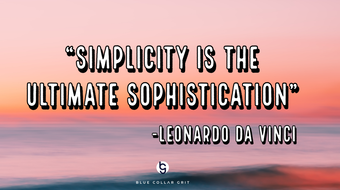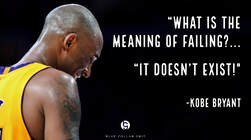Simple Is Not SimpleThe offensive anchors for our basketball program are “Simple & Together”.
Together is fairly straightforward. It addresses areas such as sharing the ball, making the extra pass to the open man, being a good teammate, doing your job on every possession, and helping teammates by screening and cutting. Most players understand this aspect rather quickly. The other tenant, simple, is much more difficult for players to understand and execute. And, I don’t think this is relegated to basketball. I see it in teams in all aspects of society. Simplicity is one of the most misunderstood and undervalued concepts we entertain. Why Should We Care? Simplicity requires understanding. “Before I studied the art, a punch was just like a punch, a kick just like a kick. After I learned the art, a punch was no longer a punch, a kick no longer a kick. Now that I’ve understood the art, a punch is just like a punch, a kick just like a kick. The height of cultivation is really nothing special. It is merely simplicity; the ability to express the utmost with the minimum.” - Bruce Lee It’s a fascinating paradox. The more we learn about something, the more we realize we don’t know. This stands in stark contrast to the YouTube phenomena in which everyone thinks they can just watch a five minute video and know everything there is to know on a specific subject. It’s simply not true. Some of the most toxic situations on a team occur when confident unknowledgeable people become the loudest, and most persistent, voice. Simplicity requires embracing the mundane. No matter how you dress it up, the simple things are never sexy. It’s exactly what makes them simple. One of the most significant mistakes we make as leaders is gradually lessening the emphasis we place on the simple things as the stakes get higher. Every accomplishment we experience is rooted in the same simple, mundane actions that we initially embraced when we started. It’s the persistence of those mundane actions that drive our success - not the lone win, the news headlines, or the SportsCenter play. Simplicity requires patience. The whole idea of delayed gratification seems like a foreign concept nowadays. Something our forefathers might of had to adhere to, but we get to skip over. This is not the case for simplicity. The riches that come from simplicity are a slow burn. Slow enough that most give up on it just before they begin to see the benefit of it. It’s the daily, boring, forgettable work that few see and even fewer value appropriately. REAL TALK - Action Steps We have so many demands, commitments, and deadlines pulling us in various directions that it’s difficult to stay focused on what is most important. Here are few ideas to assist in staying on the path of simplicity.
The daily, boring, forgettable work that few see and even fewer value is actually the straw that stirs the drink. We lead to help others be the best versions of themselves, to help them achieve things they didn’t think was possible. If that’s truly the case, we should double down on our emphasis on the simple. For more information on building excellence in your teams, visit us at www.bluecollargrit.com. We would love to know how we could help!
0 Comments
The Leadership PendulumWe’ve all been in the grocery story with the parent that has no control over a single child under his watch. This tiny menace is typically grabbing things off the shelf, invading the space of strangers, and can often be found throwing a temper tantrum at the first sign of things not going the exact way his four year old mind thinks it should. It’s brutal to watch.
We’ve all also been in a store with the parent that corrects, loudly and publicly, the slightest contrary act of their child. There is no sign of menacing behavior, many times we wonder if the child is allowed to make any decisions on their own or if they can do anything that would be viewed as ‘right’ by their adult. This is equally brutal to watch. The accommodator and the commander represent the two extremes of the leadership pendulum. A pendulum we must be intentional to control. Why Should We Care Too accommodating and we rob those we are leading of the struggle necessary to grow. In an effort to relieve immediate pain, we are unknowingly choosing to restrict long-term potential. The coddling and pacifying only sooth your need for comfort. It helps no one. Oddly enough, consistent commanding does much of the same thing. By assuming absolute control, we fail to allow those we lead to take risks, make mistakes, and come up short - or succeed beyond our expectations. This desire to direct every movement is our egotistical claim that we know best. Again, we are attempting to avoid the struggle necessary for growth. Again, to sooth our need for comfort. To be clear, both extremes have a place in which they are the perfect approach to leading, though it’s not often. Like most things, the best answer for most people is typically somewhere in between. Choosing which to use when is much of the art of leadership. That choice, which is a big one. One you should consider carefully. Also, one that requires a significant level of self-awareness. Self-awareness is clearly a superpower - as you interact with people you quickly realize the number of people that are truly self-aware and the people that can fly aren’t far apart. Yet it’s so critical for our development as leaders, and people. Self-awareness precedes every change we make in our lives. Progress is virtually impossible without it. Yet, so many of our routines and interests pull us further and further from the actualization to move us forward. Self-awareness isn’t an optional trait for leaders pursuing excellence. REAL TALK - Action Steps Here are a few questions to consider when trying to decide how you will best lead yourself and others. Our answers to these questions will be significant in identifying where we fall on the leadership pendulum between accommodating and commanding. Think about them. Write down your answers. *Questions are from Joe Ehrmann’s book InsideOut Coaching.
The leadership pendulum isn’t really a thing, but it serves as a great metaphor to prompt some self reflection that increases your awareness. Once aware, we can choose. Until then we will remain a victim of our circumstances and at the mercy of those around us. For more information on building excellence in your teams, visit us at www.bluecollargrit.com. We would love to know how we could help! Blue Chip ReflectionsWe just spent last weekend with the North Coast Blue Chips.
The Blue Chips were a national sensation in the grassroots basketball world from the fall of 2015 through the summer of 2019. The team was composed of eleven year old boys, including Bronny James, LeBron James’ son. Like most youth basketball teams, players came and went but the three that lasted from start to finish were: Bronny, Khoi Thurman, and our son, Gabe. Reflecting on Gabe’s time with the Blue Chips, reminded me of a few important leadership lessons that have been beneficial numerous times since. Here are a few of them.
There are plenty more great memories that were brought back to the surface last weekend with the Blue Chip reunion. Hopefully this message will spurn you to take the time to reflect on some of your own past experiences and the lessons that have stayed with you from them, while also realizing you are currently in the midst of experiences now that will provide you with future guidance in the years to come. For more information on building excellence in your teams, visit us at www.bluecollargrit.com. We would love to know how we could help! Attached MeaningMy dad’s father was an abusive alcoholic. My dad is not.
As a matter of fact, I can’t remember my grandpa sober. And, I can’t remember my dad having a drink. The cyclical nature of our family habits and the desire to replicate a familiar environment is a powerful force in our decision making process. It’s often an overwhelming force that provides meaning and identity, regardless of whether it’s a positive force or a negative one. I’m an alcoholic because my dad was. I never drink because my dad was an alcoholic. Both paths originate from the same trailhead. The meaning we attach to the experience will determine the path we choose. This applies far beyond our family habits. Why Should We Care? One of the most interesting aspects of coaching is the opportunity to have a first hand view of how people handle failure and adversity. A player that appears confident and determined can be sent into a full tailspin by a seemingly innocuous setback. While the next player is completely unfazed by it, or better yet, doesn’t even view it as a failure at all. The same is true for success. A little taste of success for some will spur them to continue striving and excelling while it leads to complacency and laziness in others. It all depends on the meaning we attach to the experience. Failure could be simply to evaluate, adjust, and improve the next time. It could expose a deficiency that needed light shed on it. Failure may just mean we aren’t there yet. The ‘yet’ is important. Or, failure could mean you aren’t who you thought you were. Your identity as a success is in jeopardy. It could mean that not only was what you did not good enough, you might not be good enough. The ability to be aware of the meaning we attach to events critical at a daily operational level for leaders as well. When a team member is late for work, what meaning do you attach to their reason or excuse? When one of your kids doesn’t work as hard as you think they should, what story do you tell yourself? When you don’t follow through on something at the level you want to, what is your inner dialogue? We choose the meaning we attach. Do it with intention and purpose. REAL TALK - Action Steps Indifferent and reactionary are our two deferred modes of operation in most of life. The only way it’s not is if we first become aware of the opportunity to attach the meaning of our choice. Here are few ideas that I hope help with that process:
The meaning we attach to life’s events not only shape our story about ourselves, but also our story about others. Indifference will not cut it. Awareness and intentional action is the only way to make the meaning you attach work for you, rather than against you. For more information on building excellence in your teams, visit us at www.bluecollargrit.com. We would love to know how we could help! |
About bcI'm a teacher, coach, and parent seeking excellence while defining success on my own terms. Archives
July 2024
Categories |





 RSS Feed
RSS Feed